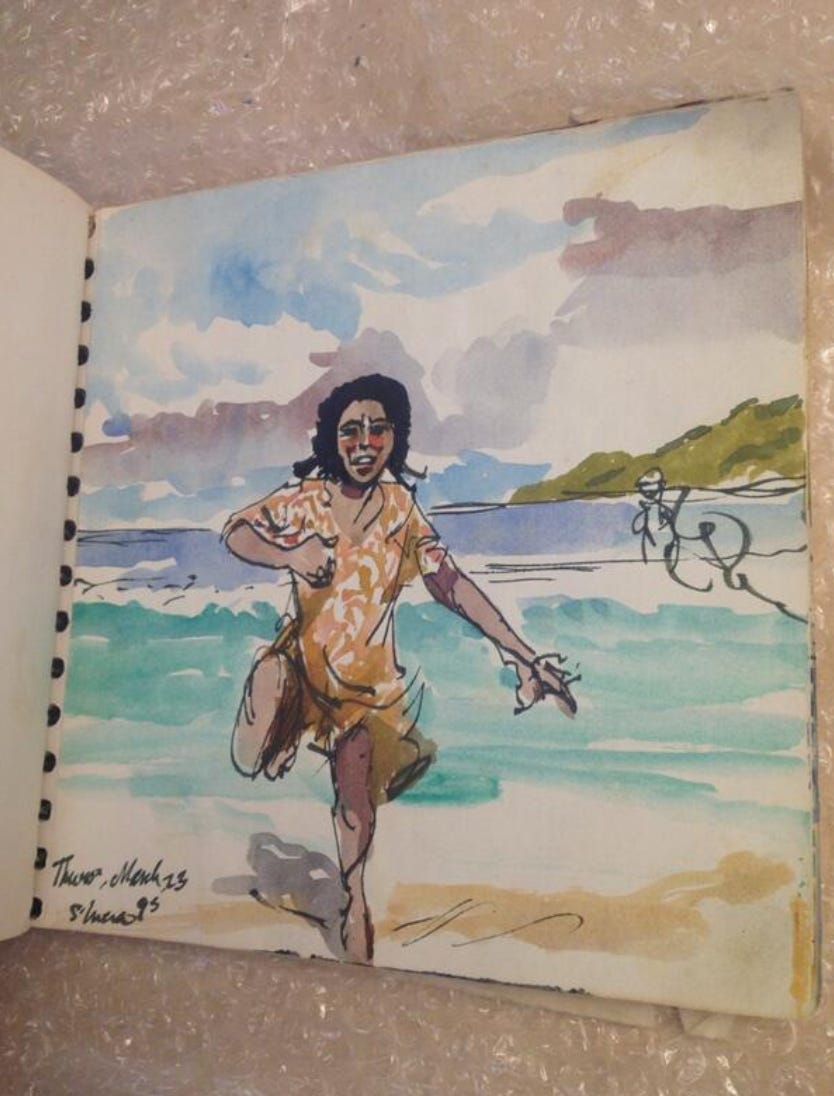In the Theater with Derek Walcott
a poet, a painter, and a playwright inside one complicated human
Poet, playwright, and painter—Derek Walcott (1930-2017) lived in Boston in the late 80’s and early 90’s, as did I. He had yet to win the Nobel Prize for literature. ****** He was always there. Entering the darkening theater as the lights went down. He was too tall to miss. Then steel drums and a stage of gorgeous men would bring the Caribbean sea to the shores of Harvard Square. How could I not fall for the color and spectacle, the wildness? The Trinidad Theater Workshop was founded with Walcott's twin brother in 1959, in the 1990's plays would travel up to Massachusetts for US premieres such as Dream on Monkey Mountain, the one that I loved most. It amazed me that a poet could also be a playwright. But Walcott was also a watercolor painter, he was a genius who defied category.
from Derek Walcott's sketchbook, 1995 That doesn't mean that Walcott was well-liked or even deeply respected in the 1990's before all the awards. I don't know that Cambridge doyennes knew what to do with him. He was most infamous for the rumors that surrounded his movement across the river---and enough rumors become taken as fact. Story was that Walcott had been asked to leave Harvard due to an affair with a student. The student was of age but had second thoughts when the affair ended. And of course it was more complicated than that---but again---rumor. These were the waters surrounding him when I first met him on the page. What stays true is his work. Love after Love Derek Walcott The time will come when, with elation, you will greet yourself arriving at your own door, in your own mirror and each will smile at the other's welcome, and say, sit here. Eat. You will love again the stranger who was your self. Give wine. Give bread, Give back your heart to itself, to the stranger who has loved you all your life, whom you ignored for another, who knows you by heart. Take down the love letters from the bookshelf the photographs, the desperate notes, peel your own image from the mirror. Sit. Feast on your life. This poem is not typical of his work, but it is one that I return to again and again---as do so many others in the aftermath of love. The sparse language, the sense of a self lost and then the step-by-step struggle to find it again. Can't you relate? But the book that convinced me that he was our 20th century Shakespeare (and more) is The Star-Apple Kingdom. I've read and re-read it----first being introduced to the lyrical patterns and cadences in grad school when Garrett Hongo read much of it aloud to our class. "I had no nation now but the imagination," Shabine states as he leaves home. I had been rootless for years: Scotland, Niger, South Africa, Bosnia, all in quick succession. Here was a poet who claimed his rootlessness---did more than claim it; Walcott elevated rootlessness to epic poetry. In the early 1990's, a close friend of mine was in Derek Walcott's MFA playwriting course at Boston University (shortly after the move across the river). On the first day of class, he told all his students that everyone would get an A. If they wanted to learn how to create plays they could also attend class. I have always wanted to try that in my own classes---but without the accent and the genius and the two X chromosomes---not sure it would work out. I won't pretend to understand all of Walcott's work. I confess, I did not make it all the way through Omeros but I believe the fault was entirely mine. What stays with me is the last time I saw Walcott speak in Boston. I'd gotten there early and was sitting in the front of the enormous ballroom. We were at the 2010 Associated Writers Conference (AWP) and he was on stage with Seamus Heaney in what turned out to be Heaney's last trip to the states (he died within a couple of months of this event). To my mind, here were two of the greatest late 20th century poets---one St.Lucian and the other Northern Irish, who against all the odds, were here in Boston commanding the stage and having such a good time as thousands of poets listened in. Everyone could tell that the two men loved and respected each other; they recited each others lines from memory---easily and with pleasure. They laughed. Where are my notes from that night? I wish I knew. As the lights came up, I turned to my friend---both of us glowing with unbounded joy and said, "THIS. This is poetry."





